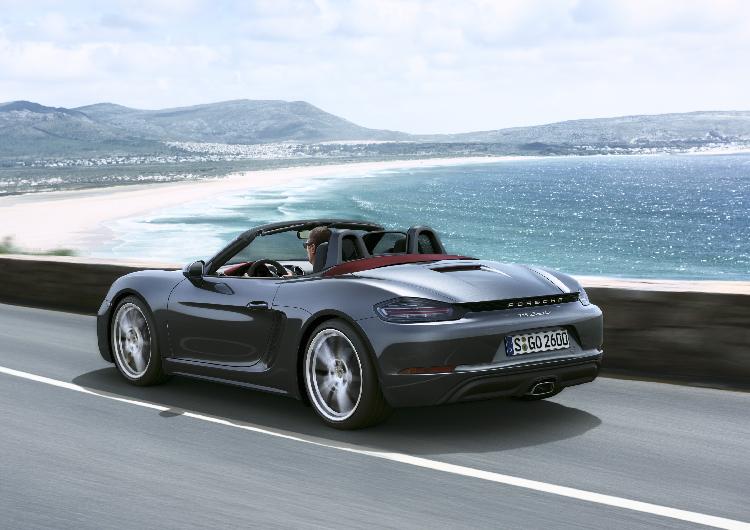
The new mid-engine roadster with four-cylinder engines: Porsche 718 Boxster
20 years after the first Boxster made its debut, Porsche is restructuring its mid-engine roadsters. With the introduction of new versions of its two-seater convertible, Porsche continues the tradition of four-cylinder flat engines used in the 718 mid-engine sports cars that won numerous races back in the 1950s and 1960s.
The newly developed engine with turbocharging result in the 718 Boxster developing 300 hp (220 kW) from 2.0 litres of engine displacement. The 718 Boxster S, on the other hand, now produces 350hp (257 kW) from 2.5 litres of displacement, using a turbocharger with variable turbine geometry (VTG). Porsche is the only manufacturer to offer VTG technology in production cars with petrol-driven engines, both in the 911 Turbo and in the 718 Boxster S. The two Boxster models feature a considerable power gain of 35 hp (26 kW) compared to their predecessors. Thanks to the new turbo engines, efficiency has been improved, resulting in up to 13 per cent lower fuel consumption.
The new chassis tuning and stronger brakes facilitate passionate and sporty driving. The exterior design of the new 718 Boxster was also completely revised. The interior now houses a newly designed dash panel that includes the latest generation of Porsche Communication Management (PCM), with a state-of-the-art touchscreen as standard as well as the optional navigation module.
Efficient turbo power from four cylinders
The launch of the new 718 Boxster generation represents the first time since the late 1960s that Porsche is again implementing sports cars with four-cylinder flat engines, which combined with turbocharging results in torque being significantly boosted. The 2.0-litre engine of the 718 Boxster has a maximum torque of 380 Nm (+ 100 Nm), available from 1,950 rpm to 4,500 rpm. The 2.5-litre engine of the 718 Boxster S produces 420 Nm (+ 60 Nm) over a speed range of 1,900 rpm to 4,500 rpm.
When equipped with Porsche Doppelkupplungsgetriebe (PDK) and Sport Chrono Package, the 718 Boxster sprints from zero to 100 km/h in 4.7 seconds (- 0.8 seconds), with a top speed of 275 km/h. Featuring the same options, the 718 Boxster S reaches the 100-km/h mark in 4.2 seconds (- 0.6 seconds) and has a top speed of 285 km/h.
The Porsche turbo concept boosts driving performance whilst improving fuel economy at the same time. With the optional PDK, the NEDC fuel consumption value for the 718 Boxster is 6.9 l/100 km (- 1.0 l/100 km) and 7.3 l/100 km (- 0.9 l/100 km) for the 718 Boxster S. Both models come with a six-speed manual transmission as standard. PDK now features fuel-saving virtual gears.
New design emphasises sharpened profile
Thanks to a range of new design highlights, the 718 model line is recognisable at first glance. The front end of the roadster has a wider appearance which incorporates larger cooling air intakes, a distinct result of the new turbo engine concept, as well as newly designed bi-xenon headlights with integrated LED daytime running lights. Now available as an option are LED headlights with four-point daytime running lights.
Emphasising the car’s dynamic look, the side profiles now include independently styled wings and side sills, alongside larger air inlet panels with two fins and doors without handle recess covers. The Boxster S features new 19-inch wheels as standard, whilst 20-inch wheels are available as an option.
The 718 Boxster’s rear features a wider appearance, owing to the redesigned accent strip, with integrated Porsche lettering. The entirely redeveloped tail lights are distinguished by the three-dimensional LED technology and four-point brake lights.
Sportier tuning of chassis for greater agility
In regards to its driving dynamics, the new roadster emulates the original 718 sports cars. The car's completely retuned chassis enhances cornering performance. Its electromechanical steering system, which is now configured to be ten per cent more direct, results in the 718 Boxster becoming more agile and easier to steer, both on the race track and in everyday traffic.
Minus ten and minus 20: Porsche Active Suspension Management
For both models, the Porsche Active Suspension Management (PASM), with a ten millimetre lower ride height, is now available as an option. In addition, the S-version can be equipped with the PASM sport chassis, resulting in a 20 millimetre lower ride height. The active chassis, which has also been retuned, offers a broader spread between long-distance touring comfort and dynamic sporty stiffness.
Extensive Sport Chrono Package for dynamic driving experience
Similar to the new 911, the optional Sport Chrono Package which comprises of three settings: Normal, Sport and Sport Plus, now also features the ‘Individual’ programme setting. When also equipped with PDK, the Sport Response Button is available to the driver to configure the responsiveness of the engine and PDK to be very direct.
Porsche Communication Management as standard
Awaiting the driver in the cockpit of the 718 Boxster is the upgraded interior with new elements, such as the instrument panel and all-new PCM unit, featuring mobile phone and audio interfaces, as well as Sound Package Plus with 110 watts of audio power. As an option, PCM can be extended further with the navigation module, operated with voice control.
The new Porsche 718 Boxster models are available for order now. First deliveries in Saudi Arabia can be expected to take place in May this year.



























